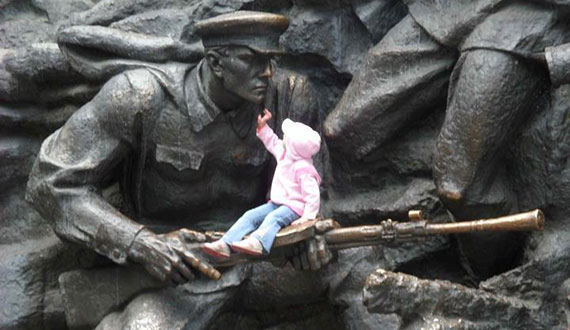
Soldier and Child, Soldier and Child at the Museum of the Great Patriotic War, Kiev. (Photo by Andr├® Simonyi)
, professor of anthropology and peace and conflict studies, recently curated a collection of short essays in a series titled ŌĆ£ŌĆØ for Cultural Anthropology, the top journal in the field.
The journalŌĆÖs editors-in-chief invited Ries to edit this collection of essays that appeared in the journalŌĆÖs ŌĆ£Hot SpotsŌĆØ forum.
ŌĆ£I chose authors I know from the United States, Russia, and Ukraine, trying to balance out disciplines, types of expertise, and perspectives,ŌĆØ said Ries.
The aim of the series is to assess the conflict between Ukraine and Russia through multiple voices and perspectives informed by long-term scholarship.
ŌĆ£The war in Russia and Ukraine is as much a war of consciousness and ideologies as it is a war of militias with guns, tanks, and Buk missile launchers,ŌĆØ said Ries in her introduction to the collection. ŌĆ£While in no way intending to minimize the physical violence of this war, our task as social observers and cultural theorists has been to create space to consider the significance of this war for social relationships and social contracts, political self-images and constructions of country, sovereignty, and the sacred.ŌĆØ
Cultural Anthropology is the only open source, peer-reviewed journal published by the American Anthropological Association. The ŌĆ£Hot SpotsŌĆØ forum is one of the journalŌĆÖs editor-reviewed web features.
The collection includes RiesŌĆÖs introduction and 10 essays from other academics from around the world who are studying the conflict.
The articles in the series ŌĆ£explore the complexity (and tragedy) of what is being done and undone in [the Ukraine-Russia] war, the ambivalences of lived reality and the intangible forms of chaos being contrived in that reality,ŌĆØ Ries wrote. ŌĆ£At the same time, [the] essays capture the everyday refusal of the flattening of memory and social perspective.ŌĆØ
While curating the essays, Ries looked to present objective, scholarly viewpoints on the conflict.
ŌĆ£I was very keen to get people to find ways to avoid fueling the ideological fires of this ŌĆśwar,ŌĆÖŌĆØ said Ries. ŌĆ£YouŌĆÖll see that none of these essays really takes clear and obvious ŌĆśsidesŌĆÖ with one country or another, but rather we are trying to rise above the fray.ŌĆØ
